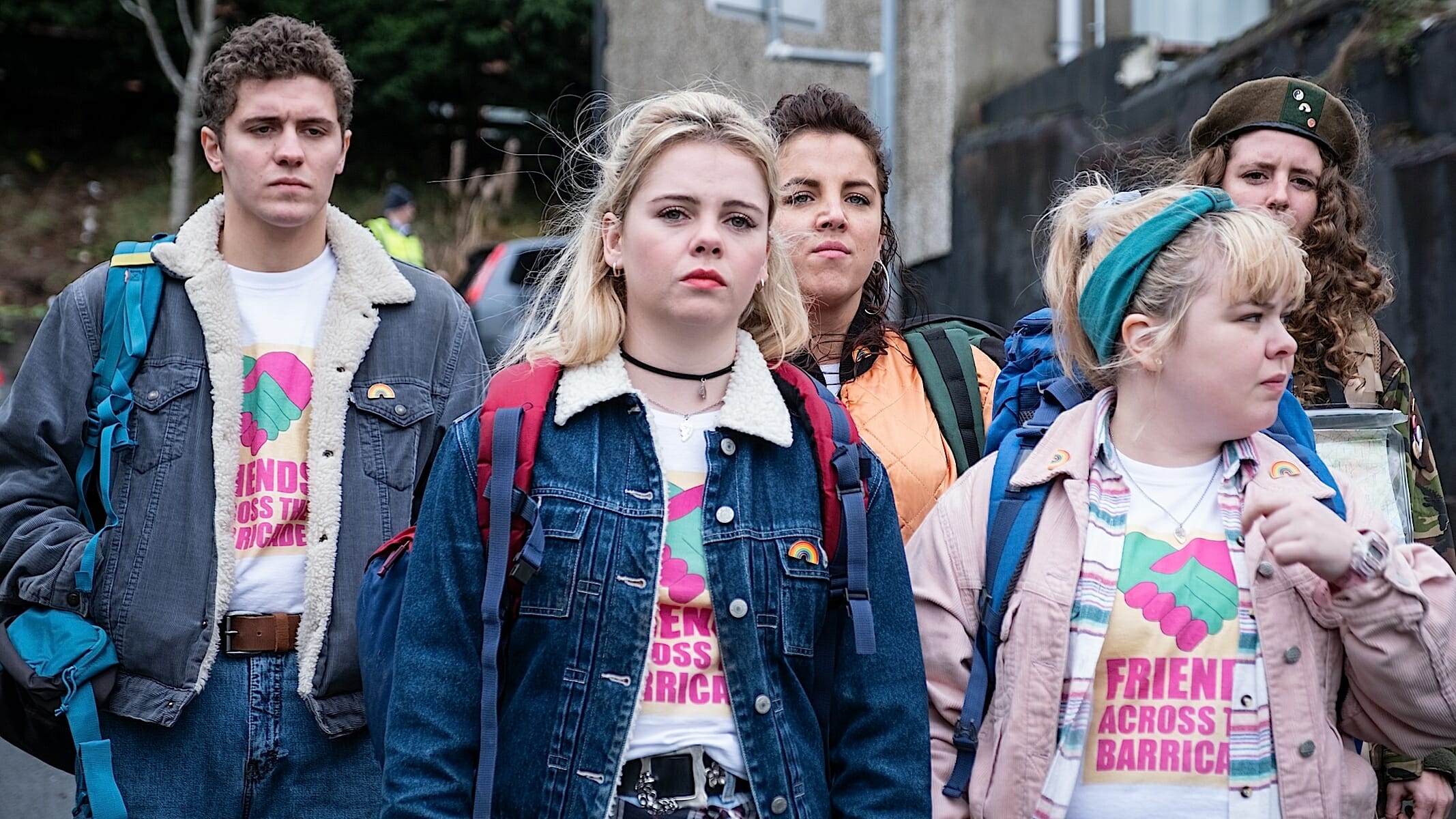Netflix’s Derry Girls Is a Hidden Gem, Even with a Wavering Second Season
Photo courtesy of Netflix
The second season of Derry Girls came to U.S. Netflix last Friday, and you should absolutely watch…the first season.
That might sound like a takedown of the new season, but it’s not. Or at least not totally—more on that in a moment. For now, because I’ve never written about Derry Girls before, I come only to praise a show that’s still somewhat obscure by American standards (though it’s the most-watched show in Northern Irish history since they started keeping records), and deserves all the attention it can get.
Derry is the second-largest city in Northern Ireland, and was, for 30 years of irregular warfare, the beating heart of the “Troubles.” This was the site of Bloody Sunday, when British soldiers killed 28 civilians protesting the policy of internment without trial, and it was the site of countless riots and acts of sectarian violence. It was also, as we learn in Derry Girls, the home of some very normal teenagers in the early ‘90s, and Lisa McGee, the show’s creator and a native herself, made a determined effort to tell their story without recourse to Northern Irish tropes. “We couldn’t present that dreary Northern Ireland again,” she told the New York Times, “where it’s always men in leather jackets, everything’s gray and nobody has a sense of humor.”
Nobody could possibly accuse McGee, or her show, of lacking humor. From the opening moments of the pilot episode, it’s frankly hysterical—it all starts with a dramatic voiceover about the life of a Catholic teenage girl in the heart of the Troubles, and just as we’re captured by the drama of the prose, we learn that it’s being read by the cousin of the author, out loud, from her diary. The expected fight ensues, played with gleeful flair by the Erin, the writer. She’s the smart, self-obsessed, and self-sabotaging lead, played by Saoirse-Monica Jackson with such over-the-top expressions that it must have taken some persistent coaching from a relentless director—”more hammy! go big!” But it works, and it works extremely well. Jackson has terrific range, embodying the angst of a 15-year-old with a kind of Kabuki-theater-meets-young-Jim-Carrey emotional extravagance that obliterates the need for realism, and the fact that she herself is 25 years old only makes the spectacle more impressive.
Erin and Cousin Orla live together with their mothers Sarah and Mary, Erin’s father Gerry, and their grandfather Joe—who hates Gerry, though his son-in-law is never anything but mild-mannered and accommodating. “I’ll find some dirt on you yet, boy. I have people working on it,” he warns him in the pilot, despite the fact that Joe has been married to his daughter for 17 years. Erin’s best friends are the timid Clare and the wild Michelle, and on their first day of school we meet Michelle’s newly arrived cousin James, who has to attend their all-girls’ Catholic school because he would get bullied for being English around the boys. For poor James, the girls hold nothing but disdain, and they consider it unforgivable whining when he worries that there’s nowhere in the all-girls school for him to use the bathroom.
Without spoiling more than I already have, I’ll just say that in my mission to get people to watch Derry Girls, I encourage them to watch the pilot, which is one of the tightest, most laugh-out-loud perfect sitcom episodes I’ve seen. From beginning to end, it’s a masterpiece, and the rest of the first season mostly delivers on that promise. McGee uses the political climate of Derry as a subtle reminder of the context of the girls’ lives, but not as a primary narrative tool. They’ll have to take a different route to school because of a bomb, for instance, and they’ll pass British soldiers with machine guns as they walk to church, but since this is ordinary to them, it’s presented as ordinary to us. It’s a wise choice, and one that allows McGee to hammer us with a staggeringly powerful scene in the finale when the implicit violence comes to the forefront, and is contrasted with the innocence and camaraderie of the girls (all of it set to the beautiful “Dreams” by the Cranberries). It pains me to say no more about the scene in question, but it has to be experienced without preconceptions, so I’ll just quietly admit that I can’t escape it without tears.
There’s not a single dud among the cast, but along with Jackson, Siobhan McSweeney deserves special mention as Sister Michael, the glowering nun who mines comedy from even the simplest reactions, as when she listens in stone-faced silence as Clare rats out all her friends in her panic to escape punishment. When she finishes her rant, Sister Michael is waiting with a deadpan expression:
-

-

-

-

-

-

-

-

-

-

-

-

-

-

-

-

-

-

-

-

-

-

-

-

-

-

-

-

-

-

-

-

-

-

-

-

-

-

-

-








































